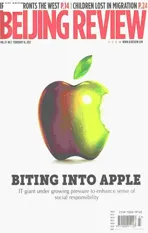Time for Change
2012-12-22本刊编辑部
Time for Change
As China is one of the key manufacturing spots for the iPad and iPhone,Chinese people are supposed to be quite proud, just like we are proud that Noah’s Ark in the movie2012was also produced in our country. China is competitive in processing and manufacturing, otherwise, Apple Inc.wouldn’t choose China in the fi rst place.
But, the fact is that besides employment opportunities and a small pro fi t out of manufacturing contracts, Apple doesn’t bring anything more bene ficial for China.
We don’t mean to blame Apple. For a company, with maximizing pro fi t as its ultimate purpose just like any other company, minimizing cost is one of its means to obtain the greatest economic gain. Normally, companies focus on the interests of shareholders rather than ordinary workers. But to be a responsible international company, Apple needs to make changes.
First, Apple needs to show more concern for workers throughout its supply chain. While making a considerable amount of money, Apple gives suppliers a very low pro fi t margin, which makes suppliers lack incentive and resources to improve workers’ welfare and factory environment. The company’s founder Steve Jobs hardly showed any concern for corporate social responsibility. After returning to Apple in 1997, he shut down all programs related to charity and never restarted them.
With a total market value of $400 billion, Apple is capable of enhancing its social responsibility by giving suppliers a more reasonable pro fi t margin, so that they can improve employees’ wages and their working environment. Jobs’successors will play a key role in the future in determining whether the company will be involved in charities. We sincerely hope they can make changes.
China’s local governments also need to keep an eye on the social responsibility of all kinds of companies and reinforce the supervision of companies that have violated China’s laws or regulations.
Apple should also change its discriminative sales policy in China.Apple always delays the release of new products in China. Early in October 2011, the iPhone 4S was put on the market in seven countries including the United States, Britain and Japan. One month later, it was launched in 22 countries or regions including South Korea and Hong Kong. But the product didn’t come to the mainland of China until January 2012. Some say it is a “starvation” marketing policy for the Chinese mainland market. But it actually is discrimination toward the market because there is absolutely no need for adopting such a marketing policy here. Judging from the long queues in front of every Apple store, people will easily know that the output of iPhone 4S cannot meet Chinese people’s enormous demand.
China has become Apple’s second largest market, a sharp contrast to the company’s discriminating marketing policy. Apple should think twice about its attitude to Chinese consumers.
We do hope Apple makes efforts to improve its image, for its own future development, and for the love of its fans.
